
Achieving the International Maritime Organization’s (IMO) goal of net zero emissions by 2050 requires a regulatory framework that has specific targets and is both technology-neutral and scientifically grounded—so say ten major international shipping groups that have invested heavily in the green transition in a joint statement.
In their statement, GasLog, GNV, Capital Group, PIL, MSC, CMA CGM, Carvival, Ponant, Brittany Ferries and the Angelicoussis Group warn that fuel assessments that lack fairness and a scientific grounding could slow progress and stifle the innovation and investment required for the green transition in shipping.
Joint Statement to ensure a Technology-Neutral and Scientifically Sound Approach to Maritime Decarbonization
As the IMO moves forward with adopting mid-term measures to implement the 2023 GHG Strategy, it is essential that the maritime sector—and the broader energy and fuel value chain— are equipped with the proper tools and policy signals necessary to deliver on these ambitions.
The frameworks being designed today will determine the credibility, pace, and cost-efficiency of the transition towards a more resilient maritime future. These mechanisms must offer regulatory clarity, investment certainty, and a strong, unified signal to the entire value chain—including fuel producers, shipowners, ports, and beyond.
A technology-neutral and scientifically grounded approach is essential. Regulatory tools must remain unbiased to stay agnostic in terms of energy, enabling continued innovation and investment in the most efficient solutions for the maritime sector. The objective must be to allow all viable solutions to contribute—on equal footing—toward the goals behind the IMO’s GHG Strategy.
By its very nature, the IMO’s GHG Strategy is designed to be agnostic with respect to fuels and technologies. This neutrality ensures the broadest possible participation and encourages diverse pathways tailored to different markets, geographies, and operational profiles. Preserving this principle is essential to sustaining innovation and ensuring the strategy remains globally applicable and adaptable.
Recent proposals to adjust the Global Fuel Standard (GFS) methodology introduce concerns in this regard. The GFS must remain grounded in scientific rigor and consistency, serving as the sole, objective reference for assessing the performance of fuels. As the maritime energy mix has evolved—and will continue to evolve—the GFS acts as the arbiter of compliance, providing a common benchmark against which all fuels can be fairly evaluated. Undermining its role by introducing alternative or shifting reference points weakens the integrity of the framework and creates confusion across the value chain.
Besides, adjustments in the recent proposals may inadvertently favor high-emission fuels like grey methanol or grey ammonia. For instance, the proposed ‘ki’ correction could reduce compliance penalties for these fuels if the reference is changed from GFS to HFO. This undermines the environmental integrity of the framework and risks misleading choices.
Moreover, claims that bio-/e-methanol are more scalable than bio-/e-methane lack scientific basis. Both are derived from the same feedstocks: waste biomass or green hydrogen combined with biogenic CO₂. There is no rational argument to support the idea that one pathway is inherently more scalable or sustainable than the other.
In this context, LNG and its journey through bio/e-methane remains a vital component of the transition. Fossil LNG offers immediate reductions in GHG and air pollutant emissions and a clear pathway to scalable renewable alternatives. Over 1,000 LNG-fueled ships are already in operation or being ordered, backed by significant infrastructure and investment. These assets are future-proofed to run on renewable methane, providing a realistic and cost-effective bridge to zero-carbon fuels.
Over penalizing LNG now would not only distort fuel choice—it would also erode market confidence. A stable, predictable framework must recognize the value of transitional investments and avoid retroactive disincentives that jeopardize capital-intensive decarbonization efforts. This is especially important for regions like SIDS and LDCs, where access to multiple fuel options is key to maintaining affordability and operational flexibility.
Adjusting compliance pricing and reward mechanisms—alongside adapting Global Fuel Intensity reduction targets accordingly—is key to effectively promoting the uptake of ZNZ emission fuels. This is the appropriate and transparent path forward. It preserves the neutrality of the framework while continuing to support the long-term transition.
Conclusion
To succeed in delivering on the IMO’s 2050 net-zero ambition, the framework must remain goal based, technology-agnostic, and scientifically robust. Artificial methodological changes risk slowing progress and stifling innovation at a time when all viable solutions must be empowered to deliver real impact.
The challenge ahead requires pragmatism, consistency, and inclusivity. Let us ensure that regulatory design reflects these values—and enables the entire sector to accelerate toward a cleaner, more resilient maritime future.
Latest News

Mayor of Athens Announces Strategy to Address Housing Crisis
Athens Mayor Haris Doukas outlined a series of municipal interventions aimed at tackling the housing crisis during a public event co-hosted with the University of Athens
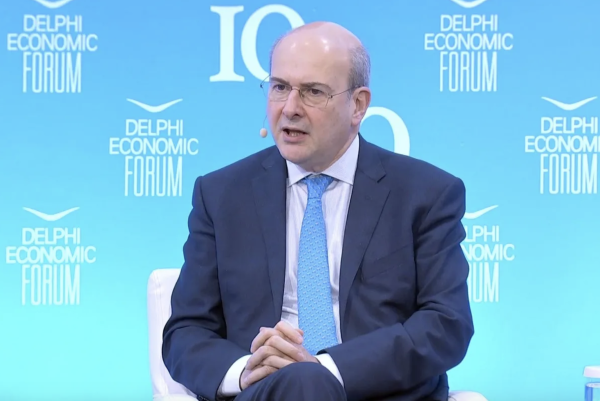
Hatzidakis at Delphi Forum: Train Reform Bill to Cabinet on April 28
The Deputy Prime Minister stated that a draft bill concerning the Hellenic Railways Organization (OSE) will be brought before the cabinet on April 28

George Tsunis at the Delphi Economic Forum X: ‘Greece Is Important to the United States’
In his interview with OT, former U.S. Ambassador to Greece George Tsunis emphasized that “strong economies create stability, and stability fosters peace.”

Airbnb Exec to To Vima: Short-Term Rentals Help Greece, But Regulation Needed
At the Delphi Economic Forum X, Valentina Reino, Airbnb’s Head of Public Policy for Southern Europe spoke to Editor-in-Cheif of TO BHMA International Edition Odin Linardatou about key issues affecting the platform—ranging from the housing crisis and over-tourism to taxation and U.S. tariffs.

Minister Kerameus Unveils Plans for Labor Market Reforms at Delphi Forum
A new labor bill that aims to significantly simplify procedures in the labor market is currently being prepared by the Ministry of Labor and Social Security, claims Minister Niki Kerameus.

Delphi Economic Forum X – Tech. Exec., Author Alvin Graylin Talks to To Vima
Graylin argues that throughout history, virtually all technologies have made humanity more efficient, adding that technology has always traditionally functioned as a tool—something a human uses to perform a task better or faster.
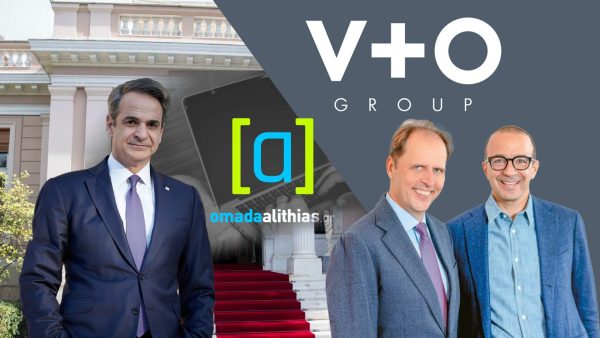
New institutionalized misconduct by ND brought to light – Covert propaganda and character assassination mechanism exposed, operated through Blue Skies by Varvitsiotis and Olympios with direct link to Maximos and Mitsotakis»
A damning investigation by Inside Story, an independent Greek investigative outlet, has exposed what appears to be a covert propaganda network operating at the heart of Greece’s ruling party, New Democracy (ND)

Inflation in Greece Eases to 2.4% in March 2025, Says ELSTAT
Rents have surged by more than 10% over the past year, and electricity prices have followed a similar trajectory.
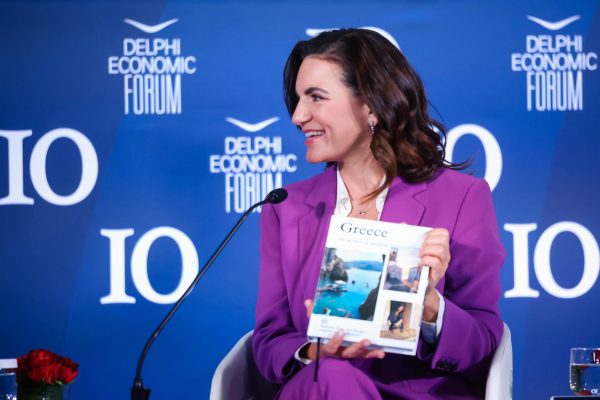
Greece Eyes New Tourist Markets, Says Minister at Delphi Forum
The Greek Tourism Ministry is aiming to tap into new markets such as India, the UAE, China, as well as increase its share in the US West Coast
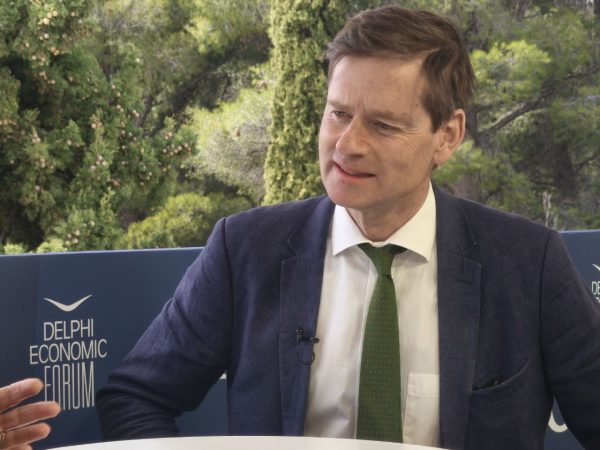
Delphi Economic Forum X 2025 – FT Journalist Alec Russell Talks Ukraine, Populism and Trump
Alec Russell, journalist and head of foreign correspondents at the Financial Times, described Trump as a “master of unpredictability.”





























![ΗΠΑ: Σύγκρουση συμφερόντων για τον «πολύ» Ιλον Μάσκ [γράφημα]](https://www.ot.gr/wp-content/uploads/2025/03/trump-musk-1-600x397.jpg)


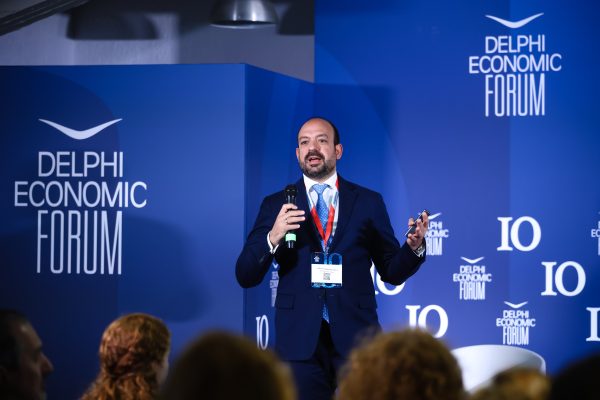








 Αριθμός Πιστοποίησης
Αριθμός Πιστοποίησης